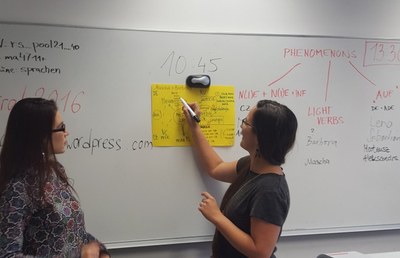CENTRAL-Kolleg: Empirical Perspectives on area-typological aspects of language contact and change (2016)
The CENTRAL-Kolleg was divided into a kick-off workshop (13-15 October 2016) and a final workshop (02-04 December 2016), which both took place at the Humboldt-Universität zu Berlin.
 The CENTRAL-Kolleg "Empirical perspectives on area-typological phenomena of language contact and language change" was intended to be a research project for students. Therefore, we considered the didactic dimension to be the primary one and designed the program in order to guide students towards individually experiencing basic principles and methods of linguistic research. Therefore, we designed the CENTRAL-Kolleg to enable "research-driven learning".
The CENTRAL-Kolleg "Empirical perspectives on area-typological phenomena of language contact and language change" was intended to be a research project for students. Therefore, we considered the didactic dimension to be the primary one and designed the program in order to guide students towards individually experiencing basic principles and methods of linguistic research. Therefore, we designed the CENTRAL-Kolleg to enable "research-driven learning".
The students collaboratively investigated selected language contact phenomena by employing recent corpus linguistic methods and thereby contributed to establishing up-to-date empirical methods in contact linguistics. We focused on synchronically oriented research on such phenomena of microvariation in the Central European languages Czech, Slovak and German which can be explained by language contact and are described as forming linguistic areas at the same time.
 The kick-off workshop was supposed to introduce the participating students to the goals and contents of the workshop, as well as to contact linguistic and corpus linguistic theory and methods. In the course of the workshop, the students formed international teams in which they proposed their research questions on research topics that had been prepared by the organizers. In designing the program, we had made an effort to alternate lectures and team sessions – the lectures were supposed to introduce theory and methods that should be applied to the according phenomenon by the students during the team sessions. Thereby we stimulated very fruitful peer to peer communication, which effectively helped to balance the differences in previous knowledge of students.
The kick-off workshop was supposed to introduce the participating students to the goals and contents of the workshop, as well as to contact linguistic and corpus linguistic theory and methods. In the course of the workshop, the students formed international teams in which they proposed their research questions on research topics that had been prepared by the organizers. In designing the program, we had made an effort to alternate lectures and team sessions – the lectures were supposed to introduce theory and methods that should be applied to the according phenomenon by the students during the team sessions. Thereby we stimulated very fruitful peer to peer communication, which effectively helped to balance the differences in previous knowledge of students.
After a group working phase the final workshop took place. It was not only dedicated to finalizing and reflecting on the working and research process but also meant let the participating students experience science communication and the presentation and dissemination of scientific results within the format of scientific conferences. The students assessed the international and interdisciplinary approach that was ensured by the CENTRAL network as very positive as enriching. For the future an elaboration of individual topics on dissertation work, the presentation of research results to specialist conferences as well as a publication are planned.
Impression from a participant:
"The participation in the Kolleg project was a great opportunity to deepen one's methodological skills and to learn more about structuring work during the research process to finally get a certain (partial) outcome. It was also an opportunity to gain an insight into scientific work in the field of linguistics at all thanks to our great researcher team."
Detailed results and further information are available on the project homepage.
Organizers
- Uliana Yazhinova | Institute of Slavic Studies | Humboldt-Universität zu Berlin
- Karolína Vyskočilová | Institute of Czech Language and Theory of Communication | Charles University
- Agnes Kim | Institute of Slavic Studies | University of Vienna
